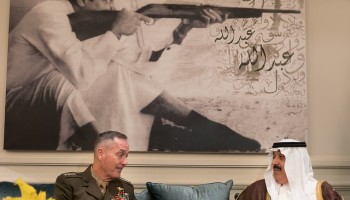The report, conducted by British QC Ben Emmerson, was published Wednesday after a five-day official inspection of the country at the invitation of the Saudi government.
The root of the problem is the government’s broad definition of terrorism. Saudi Arabia’s first counter-terrorism legislation was enacted in February 2014.
“Articles of the 2014 Law criminalise a wide spectrum of acts of peaceful expression, opinion, assembly and association, as well as freedom of thought and religion,” the UN report says.
In March of that year, the Interior Ministry expanded the definition by adding a list of acts that classified as terrorism. It included “calling for atheist thought in any form, or calling into question the fundamentals of any Islamic religion on which this country is based” as well as anyone who had “contact or correspondence with any groups, currents of thought, or individuals hostile to the Kingdom.”
The Interior Ministry was in charge of anti-terrorism but in October 2017, the task was transferred to two newly established factions of the government, both which report to the King.
The October changes also included a new article which extends the definition of terrorism to “those who describe the King or Crown Prince in any way offensive to religion or justice.”
In May 2018, Saudi police arrested the founding member of the Saudi Civil and Political Rights Association (ACPRA), Mohammed al-Bajadi. The government has been prosecuting members from the group for the last six years, Human Rights Watch reported.
The offenses were classified as crimes of misleading public opinion and defaming the loyalty and faith of council members.
Though Crown Prince Mohammed bin Salman has publicly presented himself as a reformer, critics say this is misleading.
In addition to Saudi Arabia’s early issuing of driver's licenses to women on Tuesday, the government has also been cracking down on women’s rights activists in the last month, arresting 17 activists with nine still in jail, the BBC reported.
According to the public prosecutor, the detainees allegedly admitted to communicating and cooperating with individuals and organizations opposed to the kingdom, offering support to hostile elements abroad, and seeking secret information that hurt the country’s interests, Reuters reported. All actions that violate the country’s counter-terrorism laws.
“Under crown Prince Mohammed bin Salman, Saudi Arabia is undergoing the most ruthless crackdown on political dissent that the country has experienced in decades,” Emmerson told The Guardian.
“Just as the Kingdom is handing out the first driving licences for women, it is locking up the very people who campaigned for this modest reform.”
But in addition to the broad definition of terrorism to justify acts of terror and stifle government dissent, Emmerson also addresses unfair trials in the criminal court, the use of torture, coerced confessions, and flawed investigations. He also points to the the use of the death penalty, which is given for crimes that do not involve loss of life.
The report concludes with numerous recommendations for the Saudi government and emphasizes the commitments it made when it applied to be a candidate of the Human Rights Council in 2016.
The picture that emerges from this report casts doubt upon whether it was wise for Saudi Arabia to be admitted to the Council, and threatens to undermine the authority of the Council itself in the eyes of the world,” Emmerson said in the report.






